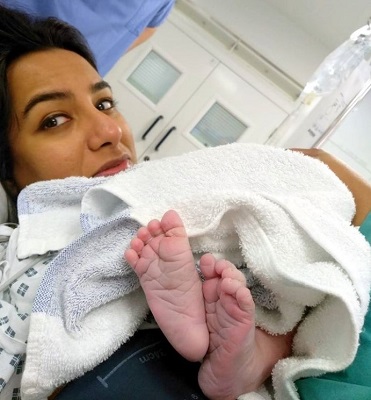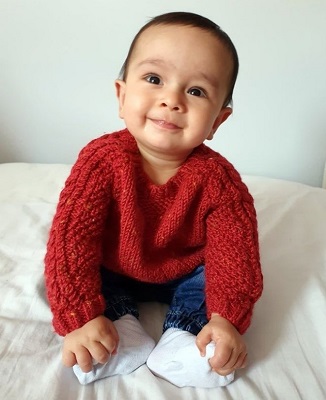A letter from a grateful new mother to staff at Frimley Park Hospital
I wanted to write to express my gratitude for some of the excellent care I received during my labour experience from 26 to 28 October 2019 at Frimley Park Hospital.
wanted to write to express my gratitude for some of the excellent care I received during my labour experience from 26 to 28 October 2019 at Frimley Park Hospital.
I attended the triage service at the labour ward during the very early hours of 26 October and was assessed by midwife Beatrice Quartieri. I had already been through 17 hours of labour, and was certainly glad that it was this midwife on shift that night. She gave a swift and efficient examination and within a matter of minutes a room was ready for us. The triage room was required for another lady but Beatrice was patient while I got dressed between contractions and got my belongings together. This midwife was one of the first experiences I had of my admission in Frimley and her professional and kind manner really made me, my husband and my mother feel more comfortable and less anxious about the long night we had ahead of us.
Our room was warm, private, quiet and reasonably dim. Midwife Sarah Stanford and student midwife Homaira Nawrozi were looking after us. These ladies were faultless. They had energy, were compassionate and had a healthy mentor-trainee dynamic. We were given a birth ball and told how to use it; my mother and husband were shown directions to the kitchen to make drinks; I was shown how to use the gas and air. It was evident that they had paid attention to my birth plan and they managed my expectations of an epidural. Sarah and Homaira also took the time to listen to my husband and my mother to relieve their concerns, too. They communicated with all three of us an appropriate amount without being too intrusive and made the experience for me as pleasant as possible.
 When I eventually asked for the epidural, I did not have to wait long before anaesthetist Laura Ashton arrived. Due to the intense pain of my baby's back-to-back position, I was unable to have much conversation with her, but she appeared reassuringly calm and confident. I am grateful to her for what might seem like ‘little things’ to doctors, but every attempt to insert a cannula leaves a permanent scar on the hand, so I am thankful that she achieved it at the first attempt. Everything was speedily prepared and she inserted the epidural swiftly and the discomfort of contractions eased after a few minutes, which I am very grateful for.
When I eventually asked for the epidural, I did not have to wait long before anaesthetist Laura Ashton arrived. Due to the intense pain of my baby's back-to-back position, I was unable to have much conversation with her, but she appeared reassuringly calm and confident. I am grateful to her for what might seem like ‘little things’ to doctors, but every attempt to insert a cannula leaves a permanent scar on the hand, so I am thankful that she achieved it at the first attempt. Everything was speedily prepared and she inserted the epidural swiftly and the discomfort of contractions eased after a few minutes, which I am very grateful for.
Unfortunately I developed intrapartum sepsis due to prolonged rupture of membranes and was escalated to the obstetric team. The consultant obstetrician, Sridevi Sankaran, addressed my concerns and was to-the-point, knowledgeable, and affirmative yet personable. She made a plan for trial of forceps with or without episiotomy in theatre, escalating to a Caesarean if needed. By this point I was nauseous and had vomited, my arms and legs were shaking, my teeth were jittering, I was feeling hot and cold, all on top of going through labour. It was Sarah Kipling, the next anaesthetist on shift, who I felt ultimately took control of the sepsis management and prompted the midwives to administer intravenous antiemetics and paracetamol.
By this point I had been in labour for 26 hours and was drifting in and out of consciousness, so I only have vague recollections of what happened next.
The theatre team from my notes were obstetric consultant Sridevi Sankaran, registrar Marwan Elfar, assistant Dr Hassan, scrub nurses Denisa Huskova, Merle Lohmus and Silvia Zucchini, healthcare assistants Jen Alejo and Josh Holdstock, midwife Rachel Benton, student midwife Alice Page, operating department practitioner Clare Musgrave, paediatric SHO B Garret and anaesthetist Sarah Kipling. I cannot imagine how a theatre team could be better than the team I had. They worked well together like a well-oiled machine, communicated with each other and with me professionally, were attentive and instilled confidence in my husband and me.
I realise it can be difficult to strike a balance between following protocols, keeping things safe in theatre, ensuring communication between all the members to perform their individual tasks but simultaneously work as one unit, all while realising that this is the most vulnerable time for a sick mother and her husband, but this was done to perfection by the theatre team. I really felt cared for and assured about high-quality care.
But from the ‘head end’ of me, the one person who ran the show was anaesthetist Sarah Kipling. My eyes were closed, I was febrile, nauseous, exhausted and, of course, going through labour, but I was very much hoping to be informed of the main events rather than just be a spectator. She kept a good balance of when to communicate – when I was being transferred from bed to surgical table, what medications were being injected, when the surgeons had started – and when to leave the exhausted mother to get a few minutes of quiet rest. She was calm, confident and kept me informed succinctly, and was very much in control of the multiple non-surgical happenings in theatre. She is a strong woman and a role model for healthcare professionals.
Someone in the theatre team asked my husband if we wanted photos to be taken. Due to the swift escalation of intrapartum sepsis, I had left my phone in the labour room. This person collected by husband’s phone from the labour ward. Though this might not be a crucial point for the medical team, this small gesture did have an impact on my husband and me (and our families and friends) as the moment is once in a lifetime and will be remembered forever. I would have regretted it if we hadn’t had any photos. It may be common for staff to arrange a photo opportunity for those giving birth in theatre, but I am really grateful to whoever it was who thought about this for us.
Registrar Marwan Elfar kept me informed about the cord being wrapped twice around my baby's neck, the quantity of blood loss, when the head was out, when the shoulders were out, etc.. All this was very valuable for someone who had intended to give birth as naturally as possible and now could not see or feel anything, and was just reliant on voices for her baby’s birth. He was responsible for suturing the episiotomy and secondary tear, and a midwife who examined me later mentioned that the suturing had been done very well, so I am appreciative for his skill and the time he gave.
I appreciate that not only were the team dealing with the mother and the baby, but they also made my husband feel very much included and he was given the chance to cut the cord – which we are thankful for.
The priority for the team was the safety of mum and baby, but the internal dread felt by the mother when she hears words like "neonatal resus" and "crash call" minutes after the birth and sees her baby’s arm being lifted and flop down lifelessly with subsequent inflation breaths being given, was very well (and possibly unknowingly) managed by the theatre team. They very calmly and professionally dealt with the situation and kept me and my husband informed when appropriate.
I really appreciated the pleasant recovery nurse who made continuous efforts to close the curtains as I was expressing milk or when pads were being changed. On returning to the labour ward, a HCA (Emma?) understood that I wanted to be in the shower alone and gracefully respected my privacy at the same time as ensuring I was safe by keeping the door open and talking to me.
When we went to the neonatal unit, a kind, respectful and patient nurse updated us on my baby’s condition. I realised that our baby’s clothes bag was not there and was probably somewhere in transit between the labour ward, postnatal ward and the neonatal unit. However, to my pleasant surprise he had been dressed in a clean, new onesie. I was unable to see him for five hours after the birth due to a long stay in recovery, and it was reassuring to see that he had been well looked after.
The paediatric SHO Dr Ahmed Megahed was an absolute pleasure to speak to – he was busy, but listened to our concerns and answered our queries confidently. It had been very reassuring to speak to him about my baby’s condition and management plan. My mother and I still remember how nice his manner was.
After 26 hours of a difficult labour, the demands of caring for a new human, hormonal changes, sleep deprivation and attempting to establish breastfeeding, I really just wanted to go home. Unfortunately, we had to spend two nights in the postnatal ward for intravenous antibiotics for my baby and me.
I needed to do everything slowly and comfortably, and this was catered for by most staff in the postnatal ward. I was provided with a jug of water and plastic cups. Clean bedsheets, pillowcases, towels and blankets were readily available. As I had planned to exclusively breastfeed and we weren’t expecting our baby to be in the neonatal unit, we had not brought bottles or formula. The ease with which milk and bottles were available and the facilities to keep the milk safe was really appreciated. Even the ladies who delivered meals and came to ask about menu choices were friendly and helpful. There was a Muslim prayer facility in the hospital, which my mother used frequently and is grateful for. Homaira, the student midwife, came to see how we were doing. I remember being exhausted by this point but it was nice of her to do so. Additionally, I am grateful to those staff members who made a conscientious effort to close the curtains properly to allow a fairly immobile lady to breastfeed and give privacy.
One of the obstetric clinical fellows was involved in our care. At a time when we really wanted to go home from a hot, bustling and busy postnatal ward, the conversation with her really was a gem. She told us the plan – something we really wanted to know – and escalated to her consultant when unsure and came back to us with answers. She had a calm and collected manner and tried to answer all our questions. The discharging midwife, Laura Sillence, seemed very busy but made sure to give us the time to go through relevant information verbally and through leaflets, and remained polite and professional. Though I was asked about the BCG vaccine, which protects against tuberculosis, for my baby straight after birth and had agreed to this, it had not yet been administered. When Laura realised this, she arranged for it to be given immediately so our discharge was not delayed.
Please pass my thanks to everyone I have mentioned. Frimley Park Hospital really has some exceptional staff who are role models to healthcare workers. I look forward to returning to Frimley if I have another child in the future.
Best wishes,
Ayesha Karimi
(Mother of Zaheer Edward Rushton)

